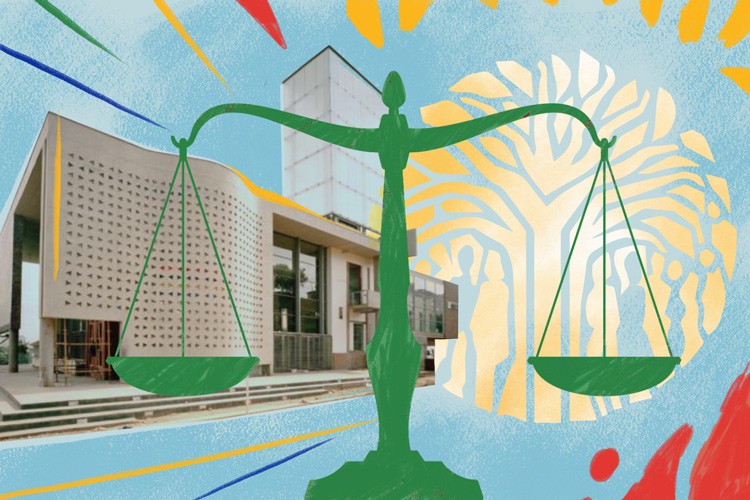
17 June 2025
The Children’s Institute has taken Home Affairs to court over its late birth registration backlog. Illustration: Lisa Nelson
At least a quarter of a million people have been waiting years for their applications for late birth registration to be processed. And this is a conservative estimate, the Children’s Institute says in its papers filed with the Western Cape High Court. The court application seeks to put the Department of Home Affairs (DHA) on terms to take action to tackle the backlog.
The institute, represented by the Legal Resources Centre, says the department’s tardy approach to this issue, which affects fundamental rights of children and their parents and caregivers, must be declared unconstitutional. It wants the court to order that the DHA develop a clear and comprehensive plan to tackle the backlog and prevent future backlogs.
The court papers are full of personal stories of how some people are left waiting for up to seven years to have their applications decided, and how it affects them.
One, the mother of a now 15-year-old, described how she grew up without a birth certificate and was constantly threatened that she would not be allowed to write matric. Now her son is having the same experience, though she applied for his birth certificate when he was eight. A keen soccer player, he could no longer participate in tournaments and had a recent brush with the law.
Parents of a 13-year-old, said she had been “expelled” from school twice because she had no birth certificate. She was eventually accepted at a school far from home, where she felt ostracised.
Generally, without birth certificates, children cannot get identity documents. And without proof of identity it is very difficult to access the schooling system. They cannot operate within the formal economy and battle to access social grants.
“They find themselves pushed further and further to the fringes of society,” legal researcher Mbonisi Nyathi says in his affidavit.
Since launching the application on behalf of 15 affected clients, the DHA has taken action to resolve these particular cases.
In a “briefing note”, senior researcher Paula Proudlock says the 15 caregivers involved in the case are primarily mothers, while others are fathers, relatives, foster parents and prospective adoptive parents, who have all lodged applications with Home Affairs for the late registration of their children’s births (and in two instances for their own births).
“Despite submitting all the necessary documents and complying with the provisions of the Births and Deaths Registration Act and its Regulations, they have been forced to wait for between two and seven years for Home Affairs to decide their applications. Most of them have followed-up multiple times over the years, incurring high transport costs, only to be told to go home and wait for a call for an interview,“ Proudlock said.
“Since belatedly becoming aware of the litigation in late May 2025, Home Affairs had prioritised holding interviews to finalise the applications of the 15 caregivers who are involved in our case,” she said. “Concerningly, these interviews have generally focussed on questioning the circumstances which caused the late registration to be necessary and coercing mothers to admit they were negligent, in order for the interview to be short and successful. Ten of the 15 individuals have to date been issued with birth certificates.”
In the court application, Nyathi said that while the institute supported the policy that births should ordinarily be registered within 30 days, there were many reasons why this does not happen, so there would always have to be a system to deal with late birth registration.
He said some babies were born at home in isolated rural areas, where sometimes cultural practices required mother and child to remain at home for up to three months.
Many mothers did not have their own IDs because they were young (between 15 and 21) and either had not applied for an ID or were also victims of the LBR system. Without an ID they could not use the birth registration desk at the hospital or clinic where they gave birth, Nyathi said.
He said the late birth registration process was arduous because it involved verifying documents and because of the insistence by DHA on conducting interviews, despite this not being required by law.
There was no co-operation between offices in different provinces and applications were being dealt with manually, in paper folders in local offices, making them “invisible to national office and more susceptible to loss and neglect”.
“A significant contributing factor is the DHA’s failure to acknowledge the backlog and the factors within its control that have created it,” Nyathi said.
He said while the DHA had promised to address backlogs for temporary resident and permanent resident permits and unabridged marriage and death certificates, no mention had been made of the late birth application backlog.
“Ultimately this situation is untenable and violates the constitutional rights of hundreds of thousands of children and adults,” Nyathi said.
“Not only does this impact their own lives, but it creates an intergenerational ripple effect, ultimately resulting in their children also remaining unregistered after birth for significant periods of time.”
The government respondents, including the Minister and Director-General of Home Affairs, have filed a notice of opposition but have not filed opposing papers within the stipulated deadline.